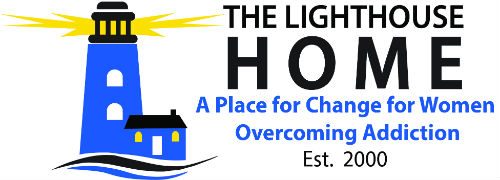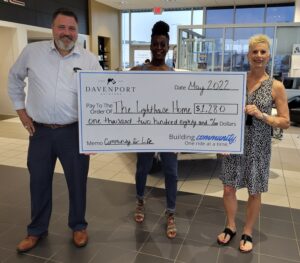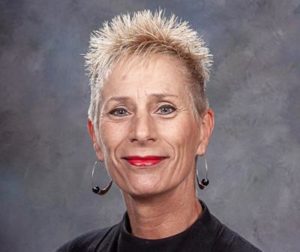It’s not on the river and has nothing to do with leading boats to safety.
The Lighthouse Home, on Eastern Avenue in Rocky Mount, is a 501(c)3 nonprofit organization that offers shelter to women who are in transition and need a place to call home as they work toward the next chapter of their lives.
It provides a structured and supportive environment for women who need a fresh start while struggling to fight back against substance abuse and subsequent life events that left them without shelter. These women come from all walks of life: Young women and elders, scholars and high school dropouts, locals and even those who have traveled a great distance to start over.
Vanessa Scaife, director of The Lighthouse Home, is the light; the beacon that welcomes and offers refuge to women who have gone far too long without it and are looking for a safe port to heal and soak up strength for the battle of their lives.
“Drug addiction makes you hopeless and helpless and even after you’ve detoxed and the drugs are out of your system, it can be hard to change your thinking — to see the possibilities for your life and to forgive all the things you’ve squandered,” Scaife said. “I know those feelings. I’ve lived those feelings. And I’m here to show women that come here how to come through what they’re going through and heal. I help them feel hope again.”
The Lighthouse Home is having an open house event from 11 a.m. to 1 p.m. Saturday to offer the community a chance to see the home and meet some of the women who have moved on and up after staying at The Lighthouse Home.
The house can shelter up to seven women and has one temporary bed that can serve as a crisis bed for short-term purposes. The women cook for themselves, clean the home and go to therapy classes, AA meetings and job training classes.
The goal for the women is to become healthy and self-sufficient, moving out on their own when they’re ready. There is no one-size-fits-all timeline and Scaife works with each woman individually to establish goals and milestones.
Volunteer Shirley McAvoy of Rocky Mount says the board of directors and core group of volunteers for The Lighthouse Home are hoping once the community comes in and sees what Scaife and the home is about, they’ll want to help. McAvoy said the more help Scaife has from volunteers, the more time she can spend with the girls at the house.
“I wouldn’t be good helping the girls — I can’t do what Vanessa does, but I can help in other ways so Vanessa can do what she’s best at,” she said.
McAvoy assists with communications and maintaining the website, thelighthousehome.com.
Scaife said her biggest supporters are her church family at Unitarian Universalist Fellowship of Rocky Mount.
“They’ve pretty much been the only constant supporter for the last 10 years. They are a big part of who we are,” she said.
Scaife opened the home to local women in need of shelter about 20 years ago. She was recovering from years of addiction, saved money to purchase her home and felt called to share her experience of recovery with others.
“I just remember looking back at my hopelessness, and thinking. ‘I could show other women how to get out of that pit,’”
So Scaife starting sharing. She shares her home and her experiences. She shares her resources and her purpose in life with some of the most forgotten and given-up-on people in the community.
Scaife and McAvoy agreed helping these women, slowly, one at a time, is the key to healing entire families — and hopefully, communities.
“A woman that has stayed here and is successful leaves and goes back out into the community as a productive, healthy person — that’s the person who reaches out and is a beacon to another person. Her life has changed because of another human being, who also was in her place before her,” Scaife said. “There is something a person who has been through the recovery process, who has been an addict, can offer someone currently addicted that no one else can do, can understand.
“Women that stay here, they pass it on. They would be able to reach out and be a light to another family, to offer hope.”
McAvoy said the home is always in need of bus tokens, linens, food and pantry supplies and toiletries.
“It’s a remarkable thing Vanessa does at this house,” McAvoy said. “The women come here and can take a deep breath. They’re not scared. They can put the focus on their recovery. It’s not just a shelter. It’s a home, as long as they need it.”
Scaife said she hopes that when people come to the open house, it will be easier to understand what she does and the role The Lighthouse Home plays in the community.
“There is a sense of forgiveness and non-judgement here. Addiction is a disease,” Scaife said. “I tell women that come to this home, ‘You are no longer the problem in society, you can make a change. Don’t be afraid.’
“It’s a slow healing, recovering from addiction. But if you have a safe place to do it, it sticks. It changes something inside of them — not just waiting out the physical part of getting off drugs, but healing, from the inside, out.”
For more information about the open house and address for The Lighthouse Home, call Scaife at 252-314-0975 or check out their website at www.thelighthousehome.com.



 Twenty-one years ago, Vanessa Scaife opened the entrance door of the Lighthouse Home with the intention of helping women transition from one chapter of life to another one.
Twenty-one years ago, Vanessa Scaife opened the entrance door of the Lighthouse Home with the intention of helping women transition from one chapter of life to another one.





